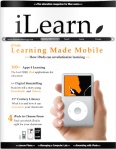– by Randy Lyseng
Change is all around us. In the words of Karl Fisch, Shift Happens! (see the latest Did You Know video on YouTube. But how do we respond to teachers who grapple with technology change in the classroom?
On the ISTE Connects Blog this morning, I found a great post about Dennis Baron’s new book A Better Pencil. Here’s an excerpt of the post:
His new book takes a look at people’s fear of computers having a negative impact on various aspects of human interaction, including common complaints that instant messaging (IM) is ruining the English language and that Facebook is causing us to be anti-social. Baron argues that we don’t need to be concerned. He feels computers are improving writing and actually making us more social. And what I found to be most interesting is his view that this fear of ‘changing technology’ is nothing new.
And it’s true…it is nothing new. In the final phase of my student teaching, my cooperating teacher used the Gestetner printer and refused to use the photocopier. I preferred using Mechanical pencils in University vs. the standard HB. I was able to use a calculator in my grade 12 diploma exam…this first year it was allowed (1985). Some teachers are petrified of using the new SMARTBoard in their class and prefer to use the overhead and project it on their SMARTBoard instead.
Megan Dolman, the author of the post on ISTE Connects provides us with some great advice for working these hesitant teachers:
When you come up against people that are hesitant to implement technology it may be a good idea to remember what Baron is saying: this fear of new communication tools is as old as the pencil. Reassure them that just as the telephone didn’t lessen the need or desire for face-to-face conversations, Facebook and other social media won’t either!
The times…well they are always changing.
 TIPS Blog RSS Feed
TIPS Blog RSS Feed TIPS on Share.epsb.ca
TIPS on Share.epsb.ca TIPS on Twitter
TIPS on Twitter TIPS on YouTube
TIPS on YouTube
 As an active participant in the AISI Leadership Team (ALT), TIPS members will be reporting on issues in technology planning that relate to the AISI project. One of the roles defined for members of the ALT is that they “…engage in the communication/knowledge dissemination of the AISI Cycle 4…”. As such we will be using this blog from time to time to relate information that has been presented to members of the ALT or appears on the
As an active participant in the AISI Leadership Team (ALT), TIPS members will be reporting on issues in technology planning that relate to the AISI project. One of the roles defined for members of the ALT is that they “…engage in the communication/knowledge dissemination of the AISI Cycle 4…”. As such we will be using this blog from time to time to relate information that has been presented to members of the ALT or appears on the  Alberta’s International Space Station Event is set to take place on September 23 at 9:25 AM.
Alberta’s International Space Station Event is set to take place on September 23 at 9:25 AM.



